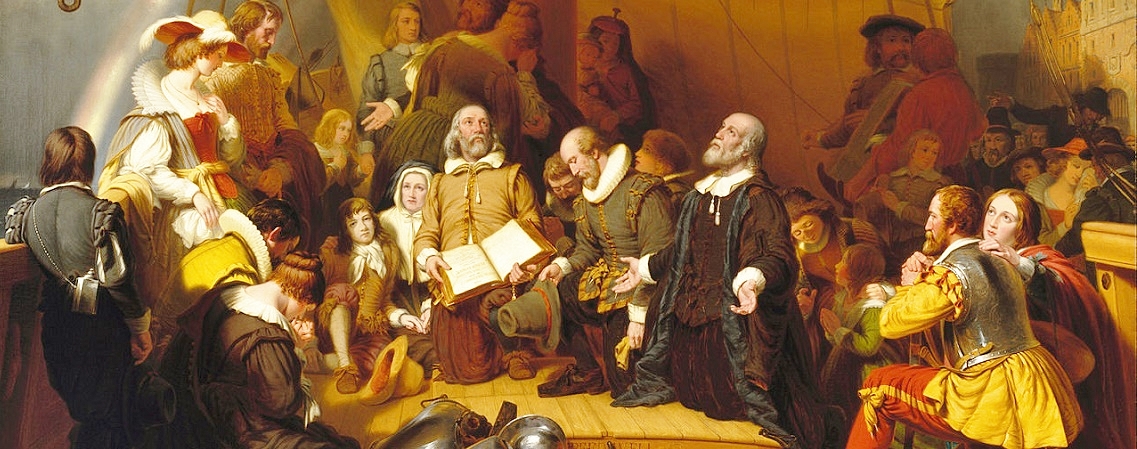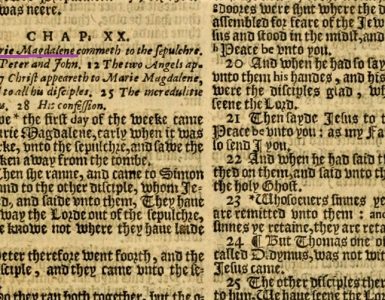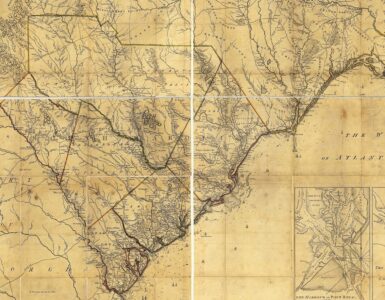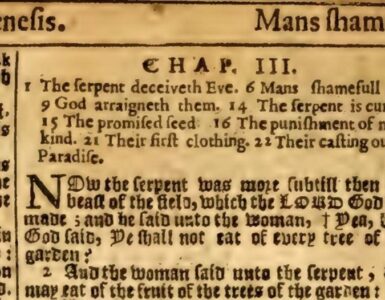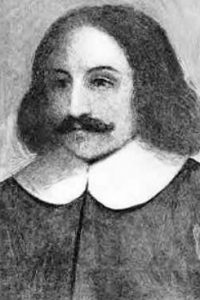 While strolling the mall just a few days before Reformation Day, I noticed that the theme-oriented temporary stores, glittering foil ice sickles, Santa’s centrally located seat, holiday food vendors, and the colors red and green were already making their annual appearance. Now keep in mind for those unfamiliar with the day of year that the Reformation began is the same as Halloween. My memory may be off, but it seems to me that not so long ago the annual marketing event known as “Christmas,” or more generically, “The Holidays,” did not begin touting its wares until the Friday after Thanksgiving. After all, it was probably not too long ago that many of those gifts that were so desperately needed last year were tossed on the pile in the garage made up of necessary gifts from years before. Thanksgiving is the forgotten, or maybe suppressed, event between the night for goblins and the day for gifts. To be thankful one has to admit the need of someone else, whether it is asking for a ride to work or a reference for a job application. The trouble is, every person needs God because he brings the rain to fall, he provides the air that is breathed, and a beautiful creation, but it seems he is the one forgotten, or ignored, even though “every good and every perfect gift comes from above” (James 1:17). The selection transcribed in this article is an excerpt from William Bradford’s Of Plymouth Plantation, which is his account of the settlement of Plymouth Colony from 1620 to 1647.
While strolling the mall just a few days before Reformation Day, I noticed that the theme-oriented temporary stores, glittering foil ice sickles, Santa’s centrally located seat, holiday food vendors, and the colors red and green were already making their annual appearance. Now keep in mind for those unfamiliar with the day of year that the Reformation began is the same as Halloween. My memory may be off, but it seems to me that not so long ago the annual marketing event known as “Christmas,” or more generically, “The Holidays,” did not begin touting its wares until the Friday after Thanksgiving. After all, it was probably not too long ago that many of those gifts that were so desperately needed last year were tossed on the pile in the garage made up of necessary gifts from years before. Thanksgiving is the forgotten, or maybe suppressed, event between the night for goblins and the day for gifts. To be thankful one has to admit the need of someone else, whether it is asking for a ride to work or a reference for a job application. The trouble is, every person needs God because he brings the rain to fall, he provides the air that is breathed, and a beautiful creation, but it seems he is the one forgotten, or ignored, even though “every good and every perfect gift comes from above” (James 1:17). The selection transcribed in this article is an excerpt from William Bradford’s Of Plymouth Plantation, which is his account of the settlement of Plymouth Colony from 1620 to 1647.
William was born to William and Alice Hanson Bradford in Austerfield, Yorkshire, England, early in 1590. He had two sisters, his father was a farmer, and his mother was the daughter of a local shopkeeper. His father died when William was an infant. By the age of twelve he was a voracious reader of his Geneva Bible which he often quoted in Of Plymouth Plantation. Influenced by William Brewster of the nearby village of Scrooby, he adopted congregational church government and separated from the Church of England. Due to persecution in his homeland he moved with other dissenters to Amsterdam, briefly, and then Leyden in the Netherlands. He taught himself Dutch and some Hebrew and Latin. When he was twenty-one years old in 1611, he received his inheritance and went into business as a weaver. His pastor in Leyden was John Robinson. Weaver Bradford impressed the leaders of his church with his abilities sufficiently that he and his wife Dorothy May were included among the pilgrims headed to the New World. Having arrived in the depths of winter after the long sea voyage, the conditions were tough. While he was away with an exploration party surveying the area by boat, a trip that included the landing of December 11, 1620 at Plymouth, Dorothy drowned in the ocean as she awaited his return. It is believed, though Bradford does not say this specifically, that she committed suicide because the desolation and extreme conditions of her new home were too much for her. In May 1621, Gov. John Carver died, then William Bradford at the age of thirty one was unanimously elected the second leader of Plymouth Colony, a position he held almost continually until his death May 9, 1657. At the time he died he had a library of about 400 books, which was quite a collection for one to have in the era.
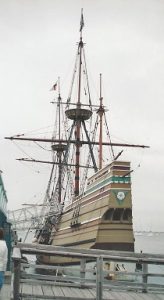 The occasion for the following account by Governor Bradford is after the arrival of a ship loaded with supplies and some new residents for the fledgling colony from his homeland. Food was already in short supply and the arrival of more mouths to feed was not well received by many already struggling to keep alive. At the end of the text, it is mentioned that loaded onto the ship for its return voyage were pelts and “clapboards,” which were sold by the Plymouth residents in their homeland to obtain funds for purchasing necessities. Also, notice how they managed to keep their corn alive in a drought and their attitude about eating lobsters. At the time lobsters were considered food for the poor and not the pricey delicacy they are currently (shows what marketing can do). I have modernized the spelling, but the structure of the composition has not been changed. Asterisks refer to notes at the end of the piece.
The occasion for the following account by Governor Bradford is after the arrival of a ship loaded with supplies and some new residents for the fledgling colony from his homeland. Food was already in short supply and the arrival of more mouths to feed was not well received by many already struggling to keep alive. At the end of the text, it is mentioned that loaded onto the ship for its return voyage were pelts and “clapboards,” which were sold by the Plymouth residents in their homeland to obtain funds for purchasing necessities. Also, notice how they managed to keep their corn alive in a drought and their attitude about eating lobsters. At the time lobsters were considered food for the poor and not the pricey delicacy they are currently (shows what marketing can do). I have modernized the spelling, but the structure of the composition has not been changed. Asterisks refer to notes at the end of the piece.
These passengers, when they saw their low and poor condition ashore, were much daunted and dismayed, and according to their diverse humors were diversely affected; some wished themselves in England again; others fell a weeping, fancying their own misery in what they saw now in others; some others were pitying the distress they saw their friends had been long in, and still were under; in a word, all were full of sadness. Only some of their old friends rejoiced to see them, and that it was no worse with them, for they could not expect it should be better, and now hoped they should enjoy better days together. And truly it was no marvel they should be thus affected, for they were in a very low condition, many were ragged in apparel, and some little better then half naked; though some that were well stored before, were well enough in this regard. But for food they were all alike, save some that had got a few pease* from the ship that was last here. The best dish they could present their friends with was a lobster, or a piece of fish, without bread or anything else but a cup of fair spring water. And the long continuance of this diet, and their labors abroad, had somewhat abated the freshness of their former complexion. But God gave them health and strength in a good measure; and showed them by experience the truth of that word, Deut. 8:3, That man “liveth not by bread only, but by every word that proceedeth out of the mouth of the Lord doth a man live.”
When I think how sadly the scripture speaks of the famine in Jacob’s time, when he said to his sons, go buy us food, that we may live and not die, Gen. 42:2. and 43:1, that the famine was great, or heavy in the land; and yet they had such great herds, and store of cattle of sundry kinds, which, besides flesh, must needs produce other food, as milk, butter and cheese, etc., and yet it was counted a sore affliction; theirs here must needs be very great, therefore, who not only wanted the staff of bread, but all these things, and had no Egypt to go too. But God fed them out of the sea for the most part, so wonderful is his providence over his in all ages; “for his mercy endureth forever” [Psalm 136:1].
On the other hand, the old planters were afraid that their corn, when it was ripe, should be imparted to the newcomers, whose provisions which they brought with them they feared would fall short before the year ran out, as indeed it did. They came to the Governor and besought him that as it was before agreed that they should set corn for their particular, and accordingly they had taken extraordinary pains there about, that they might freely enjoy the same, and they would not have a bit of the victuals now come, but wait till harvest for their own, and let the newcomers enjoy what they had brought; they would have none of it, except they could purchase any of it from them by bargain or exchange. Their request was granted them, for it gave both sides good content; for the newcomers were as much afraid that the hungry planters would eat up the provisions brought, and they should have fallen into the like condition.
This ship was in a short time loaded with clapboard, by the help of many hands. Also they sent in her all the beaver and other furs they had, and Mr. Winslow was sent over with her, to inform of all things, and procure such things as were thought needful for their present condition. By this time harvest was come, and instead of famine, now God gave them plenty, and the face of tidings was changed, to the rejoicing of the hearts of many, for which they blessed God. And the effect of their particular planting was well seen, for all had, one way and other, pretty well to bring the year about, and some of the abler sort and more industrious had some to spare, and sell to others, so as any general want or famine hath not been amongst them since to this day.
I may not here omit how, notwithstanding all their great pains and industry, and the great hopes of a large crop, the Lord seemed to blast, and take away the same, and to threaten further and more sore famine unto them, by a great drought which continued from the third week in May, till about the middle of July, without any rain, and with great heat, for the most part, insomuch as the corn began to wither away, though it was set with fish, the moisture whereof helped it much. Yet at length it began to languish sore, and some of the drier grounds were parched like withered hay, part whereof was never recovered. Upon which they set apart a solemn day of humiliation, to seek the Lord by humble and fervent prayer, in this great distress. And he was pleased to give them a gracious and speedy answer, both to their own, and the Indians admiration, that lived amongst them. For all the morning, and greatest part of the day, it was clear weather and very hot, and not a cloud or any sign of rain to be seen, yet toward evening it began to overcast and shortly after to rain, with such sweet and gentle showers, as gave them cause of rejoicing, and blessing God. It came, without either wind, or thunder, or any violence, and by degrees in that it lasted all that night in such abundance, as that the earth was thoroughly wet and soaked therewith. Which did so apparently revive and quicken the decayed corn and other fruits, as was wonderful to see, and made the Indians astonished to behold; and afterwards the Lord sent them such seasonable showers, with interchange of fair warm weather, as, through his blessing, caused a fruitful and liberal harvest, to their no small comfort and rejoicing. For which mercy, in time convenient, they also set apart a day of thanksgiving.**
“Count your blessings, name them one by one,” are the words of the hymn, and Thanksgiving should not be just a turkey-sports day between Halloween and Christmas for family and friends. Even though there is no requirement in Scripture to celebrate Thanksgiving, Christians are to be thankful for all of God’s blessings. As believers eat with non-believing family and friends they have the opportunity to testify to the existence of the Triune God, the work of redemption accomplished by Christ, and tell about the Pilgrims who gave up their homes and society to make a dangerous trip to settle Plymouth Colony and worship in freedom. A perspective on remembering Thanksgiving is similar to that which B. B. Warfield had about Christmas, see the post, “Celebrating Christmas B. B. Warfield.”
Barry Waugh
*Some readers may remember Mother Goose and her nursery rhyme, “Pease porridge hot, pease porridge cold, pease porridge in the pot nine days old.” It was a common food for mariners in the seventeenth century, thus the reason the Pilgrims would have been able to obtain some from a ship. Recipes vary, but English peas were the basis of the dish and it originated in the Middle Ages.
**The edition of William Bradford’s book used for this article is, History of Plymouth Plantation, 1620-1647, 2 vols., Boston: Massachusetts Historical Society & Houghton Mifflin Company, 1912. The selection used here was taken from vol. 1, pages 322-25. Another good and more recent edition is that of Samuel E. Morison, Of Plymouth Plantation, 1620-1647, by William Bradford Sometime Governor Thereof, New York: Alfred K. Knopf, 1993, which is the fourteenth printing of Morison’s first edition issued in 1952; if you would like a copy of Bradford’s book, this one would be a nice one and should be readily available.
Notes—You may be interested in reading the articles for Thanksgiving 2017 “The First Thanksgiving, Edward Winslow, 1621” and “Thanksgiving 2018,” both of which provide additional and overlapping information about the Plymouth Plantation’s first celebration of thanks. I noticed as I web surfed for information about Bradford that some sites have mistakenly taken a portrait of John Winthrop and designated it as Bradford and I think the error is a result of failure to read thoroughly the article on William Bradford on the Encyclopedia Britannica site. The biography of Bradford is condensed and supplemented from the brief one in Morison’s edition of Plantation, along with some help from Harry S. Stout’s biography in Dictionary of Christianity in America, IVP, 1990. The picture of Bradford is from Wikipedia and the picture of the nicely reconstructed Mayflower in Plymouth is the author’s. The header shows the Pilgrims in prayer upon arriving at Cape Cod.


